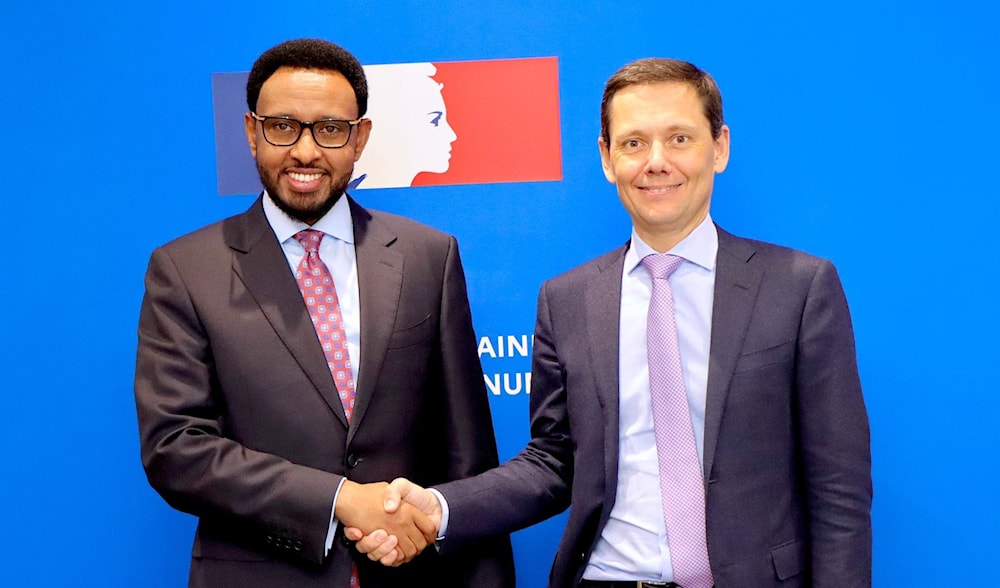Paris Club grants Somalia full debt waiver
In an attempt to replenish Somalia's economy amid a 30-year conflict, the country was granted a waiver that relieved it of a $2 billion debt.
-

Somali finance minister, Bihi Egeh, with a Paris Club official on March 13, 2024. (Social Media)
The world's wealthiest creditor nations canceled 99% of Somalia's debt to aid in its economic resurgence amid the country's three-decade-long conflict.
The Paris Club, which is run by senior officials from Somalia’s creditors, the French Treasury, and includes more nations like the US, UK, Russia, Norway, and Japan, announced in a statement on Thursday the cancelation of $2 billion of Somalia's debt to them.
The debt waiver comes as a financial scheme construed by the International Monetary Fund (IMF) and the World Bank, called the Heavily Indebted Poor Countries Initiative (HIPC), and aims at canceling higher, unsustainable levels of debt.
The HIPC is an initiative that aids debt-stricken governments in managing finances, improving transparency, and reducing poverty, making them eligible to benefit from full debt waivers. Somalia qualified for the program and would benefit from up to $4.5 billion in debt relief. The program also facilitates the extension of relations within international markets.
Debt relief to transform Somalia's future
Commenting on the matter, Somalia's minister of finance took to X and remarked on the historic change this step brings forth, saying, "Achieving full debt relief will transform Somalia's future and allow our government to create fiscal space for basic public services."
Achieving full debt relief will transform Somalia's future and allow our government to create fiscal space for basic public services. As a government we are proud of our close partnership with all the members of the Paris Clubhttps://t.co/czyIfud9oM
— Bihi Egeh (@BihiEgeh) March 13, 2024
Somalia's president, Hassan Sheikh Mohamud, said, “Somalia’s debt relief journey was no simple task; it took nearly a decade, three different administrations, two presidents, and four finance ministers to attain debt relief from the boards of the World Bank and IMF on 13 December,” and affirmed this was the first step on the path of tangible, real change for the nation.
An economist at a Mogadishu-based think tank, Uweis Abdullahi Ali from the Heritage Institute, said this paves the way for Somalia to develop and expand into international financial markets. He then highlighted how the debt relief could allow for more loans and funds, but should give the government an incentive to rely on and establish domestic revenue.
“The government should prioritize the new fiscal space for expanding essential services such as education and health and other productive investments that will bear fruit to the domestic economy.”
Read more: Hundreds die as Somalia faces famine
Somalia and Turkey officiate a new maritime agreement
This comes as Somalia moves to strengthen its relations internationally. In late February, the Somalian Council of Ministers and Parliament both approved a new maritime agreement between Somalia and Turkey, granting the latter "comprehensive authority" over Somalia's maritime territory.
The 10-year-agreement states that the Turkish Naval Forces "will protect the coasts of Somalis from terrorism", maritime hijacking operations, overfishing, and marine waste.
Recently, the Somalian and Turkish Defense Ministers signed in Ankara an agreement toward enhancing defense and economic cooperation between both countries.
Even though the Somalian-Turkish relationship is an old one, it seems that there are more efforts towards strengthening the relationships between both and ensuring the Turkish presence on Somalian land.
Read more: Somalian opposition MP calls on Russia to deploy forces in Somalia

 3 Min Read
3 Min Read








